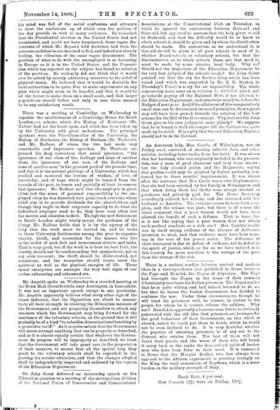An American lady, Mrs. Castle, of Wilmington, was on Friday
week convicted of stealing valuable furs, and other articles, including toast-racks, from her hotel. It was shown that her husband, who was originally included in the prosecu- tion, was a man of good character and very large means ; but the lady pleaded guilty, and the Magistrate, saying that pardon could only be granted by higher authority, sen- tenced her to three months' imprisonment. It was shown after the sentence that Mrs. Castle was a true kleptomaniac, that she had been watched by her family in Wilmington, and that when living there her thefts were always treated as purchases and privately paid for. The Home Secretary accordingly ordered her release, and she returned with her husband to America. The evidence seems to have been com- plete, and the release was just ; but there is of course the usual comment that a poor woman would not have bet allowed the benefit of such a defence. That is true ; but is it not like saying that a poor woman does not obtain such medical comforts as a rich one ? Mrs. Castle's wealth was in itself strong evidence of the absence of deliberate intention to steal, and that evidence must have been want- ing in the case of her poorer sister. The difference of their treatment is due to defect of evidence, not to defect in the spirit of justice, which, as far as we have noticed, is in this country far more sensitive to the wrongs of the poor than the wrongs of the rich.






































 Previous page
Previous page